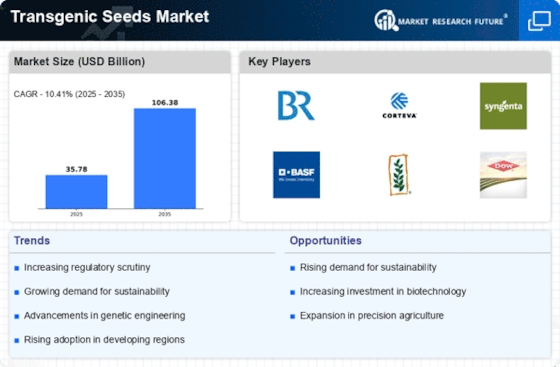Top Industry Leaders in the Transgenic Seeds Market
Strategies Adopted by Transgenic Seeds Key Players
The transgenic seeds market, encompassing seeds engineered with foreign genetic material, is a dynamic and complex space, driven by factors like innovation, regulation, and consumer preferences. Understanding the competitive landscape is crucial for stakeholders navigating this market. Here, we delve into the key players, their strategies, and emerging trends:
Key Players:
- Suntory Holdings Ltd (Japan)
- DowDuPont (US)
- Vilmorin & Cie SA (France)
- Maharashtra Hybrid Seed Company (India)
- Bayer CropScience AG (Germany)
- Monsanto (US)
- BASF SE (Germany)
- Syngenta AG (Switzerland)
- JK Agri Genetics Ltd (India)
- J.R. Simplot Co. (US)
Strategies Adopted:
- Product Diversification: Leading players are expanding their portfolios beyond herbicide-tolerant and pest-resistant crops, focusing on traits like drought tolerance, nitrogen fixation, and enhanced nutritional content.
- Mergers & Acquisitions: Consolidation is a notable trend, with larger companies acquiring smaller players to gain access to technology, germplasm, and market share.
- Vertical Integration: Some companies are integrating forward into seed distribution and farm management services, offering comprehensive solutions to farmers.
- Partnerships & Collaborations: Collaboration with research institutions, universities, and startups is fostering innovation and accelerating the development of new transgenic technologies.
Factors for Market Share Analysis:
- Geographic Reach: Companies with strong regional presence and adaptation to local needs hold an advantage.
- Trait Portfolio: Offering a diverse range of traits addressing specific regional challenges and farmer demands is crucial.
- Regulatory Landscape: Adapting to evolving regulatory frameworks and navigating approval processes efficiently is essential.
- Pricing & Branding: Competitive pricing strategies and strong brand recognition attract farmers and distributors.
- Research & Development: Continuous investment in R&D ensures access to cutting-edge technologies and a pipeline of new products.
New & Emerging Companies:
- Biotechnology Startups: Companies like Inari Agriculture and Editas Medicine are pioneering gene editing technologies, offering precise and targeted modifications to existing crops.
- Seed Companies with Novel Traits: AquaBounty's fast-growing salmon and Yield10 Bioscience's high-yielding rice illustrate the potential of transgenic technology in specific niches.
- Local Seed Developers: Companies like Seed Co. in Africa and Mahyco in India are developing region-specific transgenic varieties adapted to local conditions and farmer preferences.
Transgenic Seeds Market: News and Updates
Regulation and Policy:
- EU Court Ruling: On November 16, 2023, the European Court of Justice (ECJ) ruled that mutagenesis breeding techniques (a form of genetic modification) fall under the EU's GMO regulations. This has sparked debates about the future of gene editing technology in the EU.
- US GMO Labeling Bill: In the US, a bipartisan bill to repeal mandatory GMO labeling for certain foods was reintroduced in the House of Representatives on January 10, 2024. This could potentially ease regulations for the transgenic seeds market.
Market Trends and Innovation:
- Drought-Resistant Corn: Bayer announced the commercial launch of its DroughtGard Hybrid corn seeds in the US for the 2024 planting season. These seeds are genetically modified to withstand drought conditions, potentially boosting yields in water-scarce regions.
- Nitrogen-Fixing Soybeans: Indigo Agriculture, a startup developing nitrogen-fixing microbes for crops, raised $100 million in funding in November 2023. This could accelerate the development of transgenic soybeans that can fix their own nitrogen, reducing reliance on chemical fertilizers.
- Gene Editing for Disease Resistance: Researchers at the University of California, Davis, developed a gene-edited rice variety resistant to bacterial blight, a major rice disease. This could lead to the development of more disease-resistant transgenic seeds in the future









